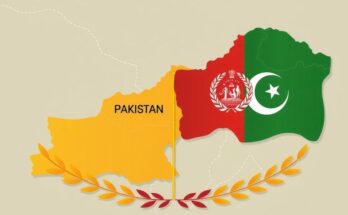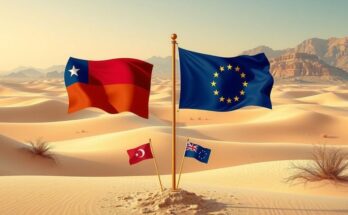The UN’s Volker Türk warns that the situation in eastern DRC, driven by the M23 conflict, could worsen without international intervention. Thousands have died since late January, compelling urgent humanitarian action. Armed groups continue to exploit resources while human rights abuses and violence escalate, necessitating a global response.
The ongoing violence in eastern Democratic Republic of the Congo (DRC) has prompted United Nations Human Rights Chief Volker Türk to express serious concerns regarding the situation. He noted that the escalation resulting from the Rwanda-backed M23 militia poses a significant threat to the local population and may lead to a broader regional crisis if international actions are not taken. Since January 26, nearly 3,000 individuals have lost their lives, with thousands more injured due to heavy fighting and attacks in civilian areas.
Hostilities persist in the mineral-rich provinces of North Kivu and South Kivu, plagued by numerous armed groups. The M23 fighters have intensified their offensive, capturing strategic territories near major urban centers, including Goma and Bukavu. This has exacerbated the humanitarian situation, forcing countless individuals to flee their homes.
During a recent Special Session of the Human Rights Council in Geneva, a draft resolution proposed calling for immediate action to halt M23’s advances and condemn Rwanda’s military support for the armed group. The resolution also emphasized the urgent need for humanitarian access to affected areas, as civilians continue to suffer the repercussions of the conflict.
Mr. Türk highlighted specific atrocities, including the bombing of hospitals and a mass prison break resulting in widespread sexual violence against women. Such incidents mark a grim continuation of the human rights abuses that have characterized this prolonged conflict in the region.
Bintou Keita, the UN’s Special Representative in the DRC, echoed concerns regarding the dire conditions in Goma, where violence continues unabated. She noted that youth are vulnerable to forced recruitment, while civil society members face threats from armed groups. The humanitarian crisis has further been worsened by health emergencies, including cholera and potential outbreaks of mpox.
The DRC’s Minister of Communications has vocally condemned external support for the M23, attributing the ongoing violence to Rwanda’s backing of the group. Conversely, the Rwandan ambassador alleged that there are preparations for an imminent attack from the DRC, highlighting the complex and contentious nature of the conflict.
Mr. Türk concluded by underscoring the global implications of the DRC crisis, calling attention to the exploitation of valuable minerals that fuel international markets. He advocated for a more comprehensive understanding of the political and economic dimensions driving the conflict, emphasizing that global stakeholders share responsibility for the plight of the DRC populace.
The crisis in the Democratic Republic of the Congo has reached alarming levels, warranting immediate international intervention. Reports indicate thousands of casualties and widespread human rights violations exacerbated by violence from armed groups like M23. The UN officials emphasize the urgent need for humanitarian access and the responsibility of the international community to address the root causes of this protracted conflict, largely linked to resource exploitation.
Original Source: news.un.org




